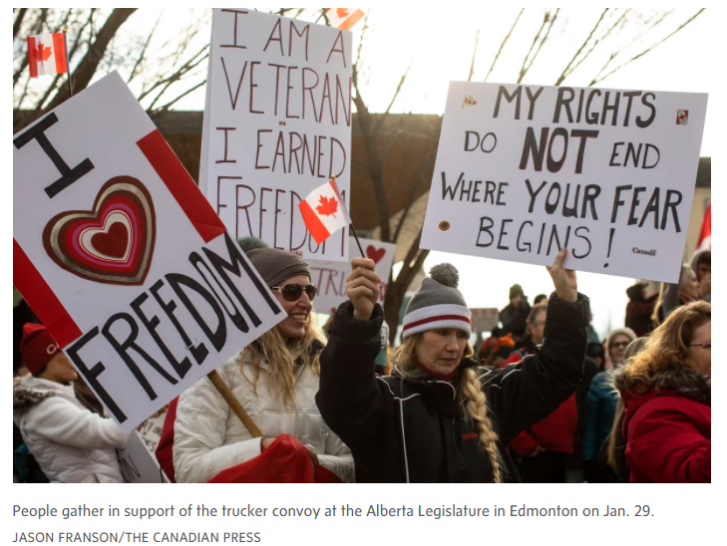Niall McKenna is a writer in Edmonton.
It was the kind of invite I never thought I’d see from a friend. A message on a group chat last September for only the unvaccinated among us to hang out – potentially sidestepping what was, at the time, Alberta’s recently introduced vaccine-mandate program.
I was livid. And confused. How had such poisoned, anti-science thinking infiltrated my carefully curated friend group of lefties and intellectuals? And how could I remove it from my life?
COVID-19 has been dubbed the “pandemic of the unvaccinated,” with health officials insisting the only way to bring down case counts, end restrictions and reach “herd immunity” was for a critical mass of people to get inoculated. Some have called those without the jab “conspiracy theorists,” “idiots” and “selfish.”
With two shots in my arm, I felt justified taking the moral high ground against the smattering of friends and family members who dared challenge the prevailing wisdom of vaccines, mandates and masks.

So I decided it was time to call out this so-called friend on the chat for her recklessness – and possibly never speak to her again.
Little did I know, I was being pulled into a potentially more sinister side effect of this pandemic: polarized thinking and a deep suspicion of anyone who didn’t share my views. If I was pro-vaccine, I dared not listen to anyone who questioned the strictest of mandates. If I wore a mask everywhere I went, I was duty-bound to silently curse those inconsiderate, maskless people.
On social media, I was rewarded with likes for my snarky comments about those unmasked “freedom-fighters” and unvaccinated buffoons. My finger twitched over the unfollow button on the Facebook profile of an Irish relative protesting her government’s “oppressive” masking in schools.
The very survival of our world, I reasoned, meant clutching onto my absolutist views. The unvaccinated – every one of them – had to be inconvenienced, shamed and even taxed into getting the shot. They were to blame and the vaccine was our only way out of this mess.
ButI later learned that it’s not true. Because the lasting sickness brought on by this pandemic is not COVID-19 itself, but the divisiveness that’s ripped our world in two. And no vaccine will cure that.
Healing the division between me and this friend started with resisting the urge to vent my outrage, and instead to have a conversation with her. To recognize that we both shared the same hurt: the fear of getting sick, the isolation and loss of friendships.
Later, I spoke to another unvaccinated friend who was kicked out of school for not getting the shot. Another felt she had to leave her career for good. Though I disagreed with the choices of these friends to not get vaccinated, their fear or skepticism of the shot was real. And so was the pain they experienced of being shut out of daily life and being ostracized by others.
Not once did these friends criticize my decision to get immunized, nor did I ever feel like I had to give up my trust in vaccines by speaking with them. Instead, I felt – for the first time – that I was united in the grief of this pandemic with the unvaccinated.
Unfortunately, feeling unity with those we disagree with seems more impossible than ever. Tribalism, polarization and identity politics appear to have shaped our attitudes about COVID-19 more than any scientific data. A poll of 4,400 Americans for the New York Times last month showed that wearing a mask and being fearful of the virus has become core to the identity of the vaccinated. In Canada, Leger’s latest edition of its ongoing pandemic poll shows a slight majority of the vaccinated saying they are afraid of getting COVID-19, while a paltry 12 per cent of the unvaccinated feel the same.
COVID-19 hospitalizations and deaths are dropping and governments and other institutions are gradually ramping down mandates, masking rules and travel restrictions across the country. Yet the tenacity of anti-vaccinemandate protests in Ottawa and at the border has shown just how deep some people identify with the perceived injustices of pandemic rules. The federal government has granted itself unprecedented powers as police move in to shut down the protests. But I fear the rifts in our country will continue to linger.
Lifting restrictions, ending protests and shifting to an endemic stage of the virus are only a start to healing these divisions. We need to recognize that we have all, vaccinated or not, been through the same struggle together. You have probably already been infected with the virus, or are close to someone who has. Together we have mourned the dead and endured the losses of jobs, businesses and social connections.
The pandemic will end and we will rebuild. But blaming the unvaccinated for the hurt will only lead to more hurt. Only by forgiving each other can we heal and move forward together.
Article From: Globe and Mail
Author: NIALL MCKENNA

